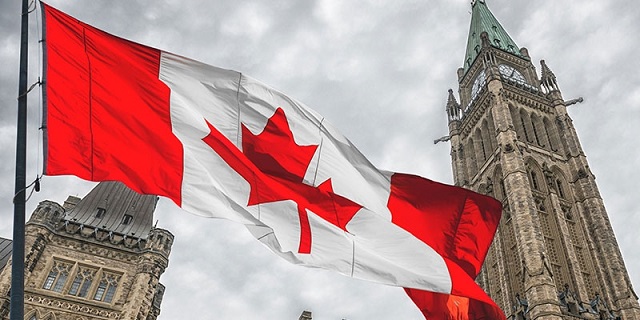Economy
Ottawa’s Regulatory Assault on the Extraction Sector and Its Impact on Investment

From the Fraser Institute
Business investment is a foundational requirement for a prosperous economy. It provides the resources to establish new companies, expand existing ones, and invest in new factories, machinery, and technologies. Business investment in Canada has declined markedly for over a decade. It is a major reason why Canadian living standards are stagnating in absolute terms and declining relative to many peer countries, particularly the United States.1
One factor behind declining business investment is the heavy regulatory burden imposed by the current federal government on the extraction sector, which includes: mining, quarrying, and oil and gas. Since 1990, this sector averaged 17.3 percent of total non-residential business investment, and reached as high as 28.7 percent of the total in 2013.2
The federal government has been particularly critical of the oil and gas sector. As an example of such sentiment, in a 2017 speech Prime Minister Trudeau said it would take time to “phase out” the oil sands, indicating the long-term goal of the federal government to eliminate the fossil fuel industry (Muzyka, 2017). The prime minister’s comments were followed by a number of new regulations that directly or indirectly targeted the oil and gas sector:
• In 2019, Bill C-69 amended and introduced federal acts to overhaul the governmental review process for approving major infrastructure projects (Parliament of Canada, 2018). The changes were heavily criticized for prolonging the already lengthy approval process, increasing uncertainty, and further politicizing the process (Green, 2019).
• In 2019, Bill C-48 changed regulations for vessels transporting oil to and from ports on British Columbia’s northern coast, effectively banning such shipments and thus limiting the ability of Canadian firms to export (Parliament of Canada, 2019).
• Indications from the federal government that a mandatory hard cap on GHG emissions would eventually be introduced for the oil and gas sector. In 2023, such a cap was introduced (Kane and Orland, 2023), excluding other GHG emitting sectors of the economy (Watson, 2022).
• In early 2023, the government announced new fuel regulations, which will further increase the cost of fuels beyond the carbon tax (ECCC, 2023).
• In late 2023, with limited consultation with industry or the provinces, the Trudeau government announced major new regulations for methane emissions in the oil and gas sector, which will almost inevitably raise costs and curtail production (Tasker, 2016).
The growing regulatory burden has a number of implications that impede or even prohibit oil and gas investment, by increasing costs and uncertainty, making it less attractive to invest in Canada. Both a 2022 survey of mining companies and a 2023 survey of petroleum companies identified the same three risks as inhibiting investment in Canadian provinces—uncertainty over disputed land claims, protected areas, and environmental regulations.3
It is also important to recognize that the Trudeau government introduced a carbon tax in 2016, which conceptually should replace regulations related to greenhouse gas (GHG) emissions such as those listed previously rather than be an additional policy lever used to manage GHG emissions.4
The regulations discussed above, as well as direct decisions by the federal government had tangible effects on the oil and gas sector:
• In late 2016, the Northern Gateway pipeline running from northern Alberta to Kitimat, British Columbia was cancelled by the Trudeau government, further limiting the ability of firms in Alberta to get their products to export markets (Tasker, 2016).
• In 2017, TransCanada Corp. cancelled its $15.7 billion Energy East pipeline, which would have transported oil from Alberta to Saint John, New Brunswick. The project was cancelled in large measure due to changes in national policy regarding the approval of large infrastructure projects (Canadian Press, 2017).
• While the Trans Mountain pipeline from Edmonton to Burnaby, BC was approved, Kinder Morgan exited the project in 2018 due to uncertainties and questions about the economics of the project, forcing the Trudeau government to take the ownership. The cost of the project has since increased by more than four times the original estimate to $30.9 billion (Globe and Mail Editorial Board, 2023).
• In 2019, US-based Devon Energy announced plans to exit Canada’s oilsands to pursue more profitable opportunities in the United States (Healing, 2019).
• In 2020, Teck Resources abandoned its $20 billion Frontier oilsands mine in Alberta because of increasing regulatory uncertainty (Connolly, 2020).
• In 2020, Warren Buffett’s Berkshire Hathaway decided not to invest $4 billion in Saguenay LNG, a liquified natural gas plant and pipeline, due to political and regulatory risks (CBC News, 2020).
The divestitures above are not an exhaustive list. Other companies including Norwegian Equinor (formerly Statoil), France’s TotalEnergies SE (formerly Total SA), US-based Murphy Oil, and ConocoPhillips have all reduced their investments in Canada’s oil and gas sector.
The government’s mounting regulations and hostilities towards the oil and gas sector did not go unnoticed outside of Canada. A 2018 article in The Economist listed the many failures to develop pipeline infrastructure in Canada to bring much-demanded oil and gas to market. Indeed, the piece called it a “three-ring circus” that risked “alienating foreign investors who are already pulling back from Canada” (Economist, 2018).
It is first important to acknowledge the overall decline in business investment in Canada since 2014. Overall, total non-residential business investment (inflation-adjusted) declined by 7.3 percent between 2014 and 2022.5, 6
The decline in business investment in the extractive sector (mining, quarrying, and oil and gas) is even more pronounced. Since 2014, business investment excluding residential structures and adjusted for inflation has declined from $101.9 billion to $49.7 billion in 2022, a reduction of 51.2 percent (figure 1).7

A similar decline in business investment of 52.1 percent is observed for conventional oil and gas, falling from $46.6 billion in 2014 to $22.3 billion in 2022 (inflation-adjusted) (figure 1). In percentage terms the decline in non-conventional oil extraction was even larger at 71.2 percent, falling from $37.3 billion in 2014 to $10.7 billion in 2022.8
Simply put, the declines in the extraction sector are larger than the total decline in overall non-residential business
investment between 2014 and 2022, indicating the magnitude of the overall effect of the decline in business investment in this sector.
The importance of business investment to the health of an economy and the rising living standards of citizens cannot be overstated. One of the major challenges facing Canadian prosperity are regulatory barriers, particularly in the oil and gas sector.
In that light, much of the regulatory burden added over the last eight years to the oil and gas sector should simply be eliminated. In some ways this is already being forced on the federal government through court decisions. For instance, in October of 2023, the Supreme Court of Canada ruled that parts of Bill C-69 were unconstitutional as they infringed on areas of exclusive provincial jurisdiction, requiring revisions to the Act (Dryden, 2023).
A careful and clear analysis is needed of the costs and benefits of the regulatory measures imposed on the oil and gas sector, including Bill C-48, the recent methane regulations, and the emissions cap. Based on this analysis, the regulatory measures should be adjusted to help improve the ability of Canada’s energy sector to attract and retain investment.
Author:
Business
The Liberal budget is a massive FAILURE: Former Liberal Cabinet Member Dan McTeague

Prime Minister Mark Carney tabled his government’s long-overdue budget yesterday and took the same approach as his predecessor – spend, spend, spend.
Canada’s deficit is now a staggering $78 BILLION. To make matters worse, Carney doubled down on the industrial carbon tax.
Dan McTeague explains in his latest video.
Daily Caller
US Eating Canada’s Lunch While Liberals Stall – Trump Admin Announces Record-Shattering Energy Report


From the Daily Caller News Foundation
By Audrey Streb
The Department of Energy (DOE) touted a report on Wednesday which states that America broke records in liquefied natural gas (LNG) exports.
The U.S. became the first country to export over 10 million metric tonnes of LNG in one month in October, Reuters reported on Monday, citing preliminary data from the financial firm LSEG. The DOE posted on X on Wednesday that “there are big opportunities ahead for U.S. natural gas” and has consistently championed LNG in a sharp departure from former President Joe Biden’s crackdown on the resource.
“The fact that America’s oil and gas industry was able to pass this stunning milestone is impressive considering all the roadblocks to progress which were thrown up by the Biden administration,” David Blackmon, an energy and policy writer who spent 40 years in the oil and gas business, told the Daily Caller News Foundation. “It is a testament to both the resilience and innovative mindset of the industry and to the phenomenal wealth of America’s natural gas resource.”
Dear Readers:
As a nonprofit, we are dependent on the generosity of our readers.
Please consider making a small donation of any amount here.
Thank you!
🗣️RECORD BREAKING: For the first time, U.S. LNG exports are projected to surpass 10 million metric tons in a single month. There are big opportunities ahead for U.S. natural gas!
— U.S. Department of Energy (@ENERGY) November 5, 2025
Two facilities in Louisiana and Texas are responsible for the LNG export surge, according to Reuters. The U.S. LNG industry emerged as an energy sector giant in recent decades, with America now leading the world in LNG exports after being projected to be a net importer as late as 2010, according to S&P Global.
The Biden administration enacted a freeze on new LNG export permits and “intentionally buried a lot of data and released a skewed study to discredit the benefits of American LNG,” the DCNF previously reported. The environmental lobby applauded Biden’s January 2024 freeze on new LNG export terminals, though critics argued that the policy stalled investment, would not reduce emissions and undermined America’s global strategic interests.
In contrast, President Donald Trump sought opportunities to bolster LNG and reversed the new permit pause through a day-one executive order. Some energy policy experts told the DCNF that the reported milestone highlights the resiliency of the industry and the benefit of Trump’s “American energy dominance” agenda.
-

 Alberta2 days ago
Alberta2 days agoAlberta government’s plan will improve access to MRIs and CT scans
-

 Business2 days ago
Business2 days agoTrump’s Tariffs Have Not Caused Economy To Collapse
-

 Daily Caller2 days ago
Daily Caller2 days agoTrump Reportedly Planning Ground Troops, Drone Strikes On Cartels In Mexico
-

 Economy1 day ago
Economy1 day agoWelcome to the Energy Humanist Club! Bill Gates breaks the moral monopoly against fossil fuels
-

 Brownstone Institute2 days ago
Brownstone Institute2 days agoBizarre Decisions about Nicotine Pouches Lead to the Wrong Products on Shelves
-

 International2 days ago
International2 days agoHours after Trump’s warning, Nigerian Christians massacred by Islamist gunmen
-

 Business2 days ago
Business2 days agoCarney government’s first budget should signal end to crippling ‘climate’ policies
-

 Business2 days ago
Business2 days agoNo Jobs Clause: Liberals Under Fire Over Stellantis Deal in Fiery Committee Showdown












